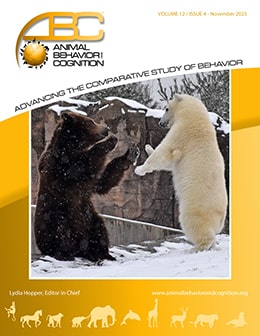Vol 12, Issue 4, November 2025
Differential Effects of Aging on Behavior in Working and Untrained Companion Dogs
Citation
Krichbaum, S., & Lazarowski, L. (2025). Differential effects of aging on behavior in working and untrained companion dogs. Animal Behavior and Cognition, 12(4), 488-497. https://doi.org/10.26451/abc.12.04.02.2025
Abstract
Aging related declines in cognition and behavior may have a detrimental impact on working dog performance and welfare. However, while aging related changes have been well documented in companion dogs, no work has determined if those findings generalize to working dogs. In the current study, we examined the effects of aging on cognitive and behavioral traits that are important for career success in working dogs using a questionnaire distributed to detection dog handlers/owners. We also included a group of breed-, age-, and sex-matched untrained companion dogs in order to directly compare the effects of age on these traits between working and non-working dogs. The questionnaire comprised a validated measure of impulsivity using the Dog Impulsivity Assessment Scale (DIAS), responses to positive and negative stimuli (Positive and Negative Affect Scale; PANAS), and canine cognitive dysfunction (CCD; Canine Cognitive Dysfunction Rating Scale; CCDR). While detection dogs demonstrated the typical relationship between increased age and prevalence of CCD, it was not associated with retirement, suggesting that detection dogs are not retired due to cognitive decline. Further, in contrast to untrained companion dogs, detection dogs demonstrated no aging related declines in aspects of behavior, including those shown to be important for working success (e.g., energy and interest). These findings are the first to demonstrate a differential effect of aging on some aspects of behavior between working and non-working dogs. We discuss these results in relation to previous findings on the declines in similar traits shown in companion dogs.
Keywords
Working dogs, Aging, Cognition, Behavior
